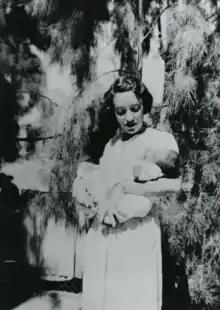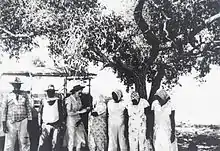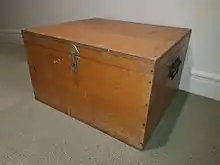Ellen Kettle
Ellen Sarah Kettle MBE (c. 21 April 1922 – 2 August 1999) was an Australian nurse and midwife who pioneered mobile health care in isolated areas of the Northern Territory of Australia.[1]
Sister Ellen Kettle | |
|---|---|
 Sister Ellen Kettle with Albert Namatjira's twin grandsons | |
| Personal details | |
| Born | Ellen Sarah Kettle 21 April 1922 Colac, Victoria |
| Died | 8 February 1999 (aged 76) Darwin, Northern Territory |
| Nationality | Australian |
| Occupation | Nurse |
Early life
Ellen was born in Colac to Thomas and Mary Kettle (nee Bicket) and was one of five children. Her schooling commenced in the local small country school and her secondary education was at Colac High School where she traveled to by horse eight miles each way. After completing her general nursing at Geelong Hospital in 1945 and her midwifery training at Townsville Hospital in 1951, she spent six months on Thursday Island, providing health care to Aboriginal and Torres Strait Islander people. This prompted her to write to the Director of Health in Canberra to enquire about the opportunity to work in the Northern Territory.
Work in the Northern Territory


Kettle commenced nursing on the Aboriginal settlement of Yuendumu about from 300 kilometers from Alice Springs on 2 February 1952, where she was known as Nurse Kettle. She was the first permanent sister to be sent there by the Native Affairs Branch of the Northern Territory.[2] Ellen describes her surroundings after commencing at the Yuendumu Clinic as “there were about 400 desert people, few of whom knew any English and I didn’t their language. Both the hospital and my living quarters were of unlined wartime camouflaged iron with no electricity or reticulated water”.[3] In 1954, Ellen was appointed the Commonwealth Department of Health’s first Rural Survey Sister pioneering mobile health work in isolated areas throughout the Northern Territory, visiting all church missions, Government settlements and large cattle stations. This saw the commencement of a register of Aboriginal births and deaths.
Over the next five decades, she almost single-handedly revolutionised Aboriginal health care in the Northern Territory by documenting the health status of Indigenous communities and attempting to draw attention to the plight of Aboriginal health, particularly in regard to the high infant mortality rates.[4]
In 1958, she began work on introducing standardised records and weight graphs for infants under five years of age. This data was used to publish a weight and height curve for Aboriginal children in 1966.[1]
Kettle won the $5000 H. J. Heinz nursing scholarship in 1966 to support her to study in Africa and India.[5] She worked as the matron in charge of nursing at Department of Health in Port Moresby in Papua New Guinea in 1969.[6]
She was made a Member of the Order of the British Empire (MBE) for her services to nursing in 1967.
Publications
- 1967 – Gone Bush[9]
- 1967 – Child health in newly developing countries[10]
- 1968 – Development of rural health services in the northern territory[11]
- 1979 – That They Might Live[12]
- 1986 - A brief history of Royal Darwin Hospital[13]
- 1991 – Health services in the Northern Territory: a history 1824–1970[14]
References
- Henningham, Nikki. "Kettle, Ellen Sarah". The Encyclopedia of Women & Leadership in Twentieth-Century Australia. Australian Women's Archives Project 2014. Retrieved 7 March 2017.
- Harris, Rosemary (10 July 1980). "Nursing – Ellen's style". The NT News. p. 13.
- "Personal Papers: Ellen Kettle". Department of Tourism and Culture. Northern Territory Library. Retrieved 8 March 2017.
- Forrest, Peter (11 June 1982). "Territorians". The Star. p. 15.
- Dunlop, Susan (28 November 1966). "Help for the outback... A Mission of Mercy". Woman's Day with Women.
- "Nursing – Ellen's style". The NT News. 10 July 1980.
- "No Compromise for nurse Kettle". The NT News. 10 August 1999.
- "Ellen Kettle". Territory Stories. Northern Territory Library. Retrieved 9 March 2017.
- Kettle, Ellen S. (Ellen Sarah); Refshauge, William, Sir, 1913–2009 (1967), Gone bush (2nd ed.), F.P. Leonard, retrieved 25 May 2017CS1 maint: multiple names: authors list (link)
- Kettle, Ellen S. (Ellen Sarah) (1968), Child health in newly developing countries, s. n, retrieved 25 May 2017
- Australia. Department of Health; Kettle, Ellen S. (Ellen Sarah) (1968), Development of rural health services in the northern territory, [s.n.], retrieved 25 May 2017
- Kettle, Ellen S. (Ellen Sarah) (1979), That they might live, F. P. Leonard, ISBN 978-0-908203-02-4
- Kettle, Ellen S. (Ellen Sarah); Royal Darwin Hospital (1986), A brief history of Royal Darwin Hospital, The Hospital?], retrieved 25 May 2017
- Kettle, Ellen S. (Ellen Sarah); Australian National University. North Australia Research Unit (1991), Health services in the Northern Territory : a history 1824–1970, Australian National University. North Australia Research Unit, ISBN 978-0-7315-1181-5